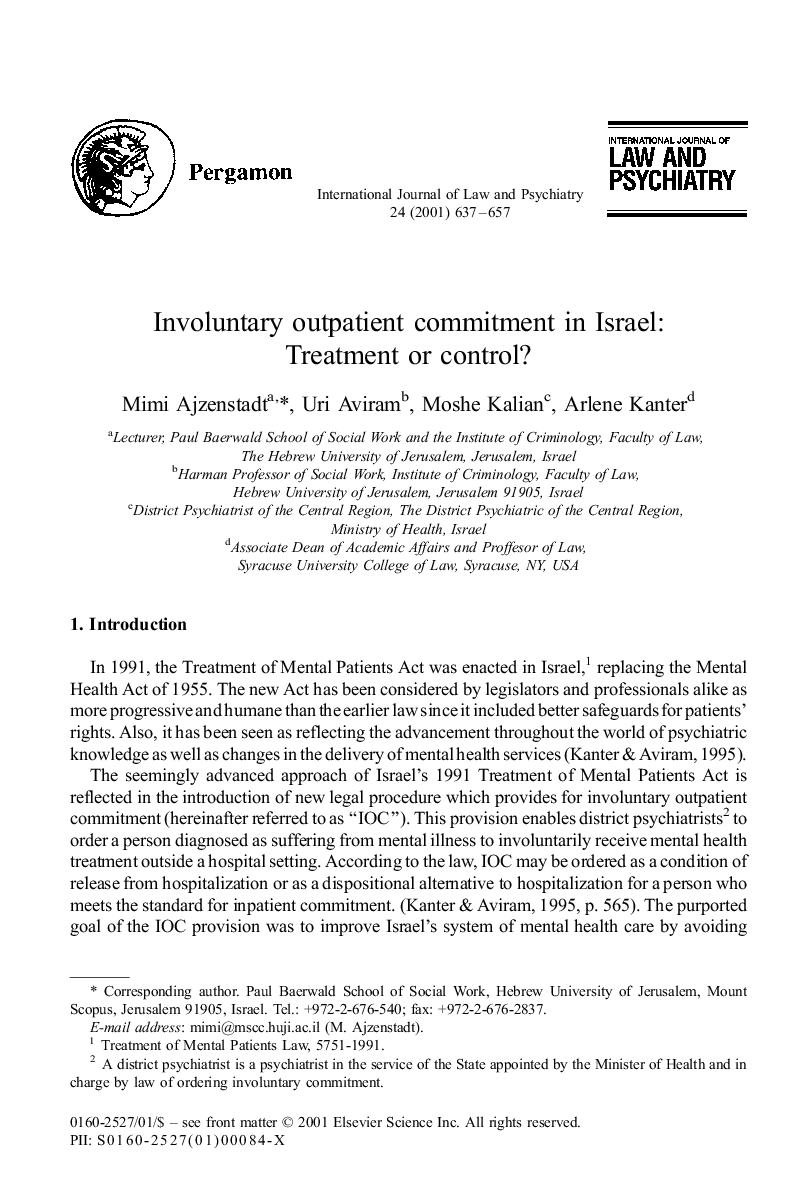انگیختگی ادراکی ایجاد حافظه های جدید اپیزودیک را بهبود می بخشد
| کد مقاله | سال انتشار | تعداد صفحات مقاله انگلیسی |
|---|---|---|
| 36547 | 2001 | 21 صفحه PDF |

Publisher : Elsevier - Science Direct (الزویر - ساینس دایرکت)
Journal : International Journal of Law and Psychiatry, Volume 24, Issue 6, 12 November 2001, Pages 637–657
مقدمه انگلیسی
In 1991, the Treatment of Mental Patients Act was enacted in Israel,1 replacing the Mental Health Act of 1955. The new Act has been considered by legislators and professionals alike as more progressive and humane than the earlier law since it included better safeguards for patients' rights. Also, it has been seen as reflecting the advancement throughout the world of psychiatric knowledge as well as changes in the delivery of mental health services (Kanter & Aviram, 1995). The seemingly advanced approach of Israel's 1991 Treatment of Mental Patients Act is reflected in the introduction of new legal procedure which provides for involuntary outpatient commitment (hereinafter referred to as “IOC”). This provision enables district psychiatrists2 to order a person diagnosed as suffering from mental illness to involuntarily receive mental health treatment outside a hospital setting. According to the law, IOC may be ordered as a condition of release from hospitalization or as a dispositional alternative to hospitalization for a person who meets the standard for inpatient commitment. (Kanter & Aviram, 1995, p. 565). The purported goal of the IOC provision was to improve Israel's system of mental health care by avoiding unnecessary institutionalization, providing more suitable treatment and care for patients in community settings Aviram et al., 2000 and Kanter & Aviram, 1995. This article describes a study designed to determine the extent to which the IOC provision of Israel's 1991 Treatment of Mental Patients Act has succeeded in accomplishing its goals, at least according to those most involved in the law's implementation. The authors reviewed available data and conducted in-depth interviews of those charged with implementing the IOC provision of the law in order to determine the extent to which IOC had fulfilled its stated goals and expectations with regard to the effectiveness of the law in preventing hospitalization while safeguarding the rights of persons suffering from mental illness. The study also sought to assess the perception of those charged with implementing the law regarding whether or not the IOC provision created a new group of patients labeled as mentally ill, subject to the regime of psychiatry. For the purpose of this study, the authors summarized data gathered by the Information and Evaluation Unit of the Mental Health Services regarding patients ordered to IOC. In addition, legal documents, Committee Reports of the Knesset (Israel's Parliament), as well as relevant Israeli newspaper articles were collected and content-analyzed. Finally, the authors conducted 30 in-depth semistructured interviews of those responsible for the operation of the law, including all of Israel's district psychiatrists, the directors of hospitals and ambulatory clinics, and several psychiatrists, nurses and social workers working in the outpatient mental health clinics. Based on this review of available data and in-depth interviews, the authors analyzed the perceptions of those involved in the law's enactment and operation. This inquiry is derived from theories and findings of policy implementation which argue that the consequences of certain policies and programs may be found to stand in stark contrast to the intent of such policies and programs (Pressman & Wildavsky, 1973, for an analysis of the implementation of mental health policies see, for example: Aviram, 1990b, Brooks, 1979, Issac & Armat, 1990, Mechanic & Rochefort, 1990, Rochefort, 1989 and Mulvey et al., 1987). The operation of mental health policy, in Israel and elsewhere, is shaped by the existing tension between the medical and legal approaches to mental health care. These two approaches differ in their attitudes towards three main conceptual and practical issues: (1) the appropriate balance between liberty interests and treatment needs of people suffering from mental illness; (2) the procedures to be followed with respect to treatment decisions; and (3) the social agent(s) who should be authorized and empowered by society to make such treatment decisions. These differences are significant to the enforcement of IOC in Israel's new law since the psychiatrists, who traditionally follow the medical model, are now empowered by the State to implement a legal regulation purportedly focusing on the protection of the rights of people with mental illness (Aviram et al., 2000 and Kanter & Aviram, 1995. See also, Horowitz, 1982, Mulvey et al., 1987 and Schwartz & Costanzo, 1987). The new Israeli IOC law was modeled after American outpatient commitment laws that sought to reconcile liberty interests with the need to provide treatment and care for mentally ill persons following the principle of providing treatment in the setting least restrictive of personal liberty. It exemplifies an international trend in mental commitment laws (e.g., Appelbaum, 1999, Eastman, 1997, Fulop, 1995, Hiday & Goodman, 1982, Kanter & Aviram, 1995, McIvor, 1998 and Torrey & Kaplan, 1995). Accordingly, a study of this provision in the Israeli law may illuminate issues of significance in other countries as well.

